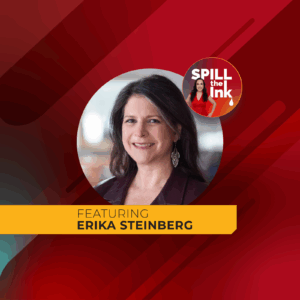
Inksights Blog : The Reputation Ink Blog
Is Your Law Firm’s Content Invisible to AI Discovery? Here’s How to Fix It
When today’s clients research law firms, they don’t rely on a single source. They create a shortlist using multiple touchpoints: Google searches, Chambers and Best Lawyers rankings, referrals, articles, LinkedIn — and increasingly, AI-powered tools like ChatGPT.
If your firm’s website content isn’t structured for this new ecosystem, you risk being overlooked before you even get a chance to compete.
Previously, I shared a big-picture look at how firms can adapt their marketing to be more discoverable in an AI-driven world. Here, we’ll zoom in on your existing content.
Many firms assume their current content is “good enough,” especially if it’s been live for years. But vague, outdated or generic pages don’t give AI engines — or human readers — the information they need to understand what you do best.
Here’s how to update your existing content so AI tools can surface your expertise and potential clients can easily recognize your value.
Why Ai Discovery matters
AI isn’t replacing traditional research — it’s adding a new layer to how clients evaluate firms. Increasingly, in-house teams are using AI tools to:
- Summarize potential firms’ qualifications
- Compare experience across practice areas
- Identify attorneys who match their specific needs
If your content isn’t specific and structured, AI has little to work with. The result? Your firm stays invisible, even if you’re the best fit for the matter.
Optimize Your Core Pages for AI Discovery
Your practice group descriptions and attorney bios are often the first pieces of content AI tools (and clients) encounter. Yet many firms treat them as an afterthought, relying on templated, high-level language that fails to communicate what makes them unique.
To stand out, focus on content that is clear, specific and structured:
1. Get Specific — No More Vague Overviews
Instead of saying: “We handle complex commercial litigation.”
Say: “We’ve represented Fortune 500 companies in disputes involving breach of contract, trade secret misappropriation and multi-state class actions.”
This level of detail helps AI understand what you actually do — and builds trust with human readers.
2. Connect Expertise to Industries and Outcomes
AI relies on explicit connections between practice descriptions, the industries you serve and the outcomes you deliver.
Example: “Our construction practice represents general contractors and design firms in disputes related to defective work, delay claims and OSHA compliance.”
The more specific your content, the better AI can categorize and surface it.
3. Tell Stories, Don’t Just List Services
Listing practice areas isn’t enough. Show how you solve problems by weaving in short case narratives.
Example: “We helped a national healthcare provider resolve a complex regulatory investigation, avoiding litigation and minimizing reputational damage.”
4. Showcase Results and Credibility Markers
When appropriate, highlight outcomes that signal authority and trustworthiness:
- Case wins and settlements
- Awards and rankings
- Notable client relationships (when permitted)
Example: “Successfully defended a leading tech company in a $50M intellectual property dispute, resulting in full dismissal of claims.”
Ask Questions as you edit
As you review your pages, keep these questions in mind:
- Are you specific? Instead of simply stating services, describe the actual matters the firm has handled.
Example: “Secured a six-figure settlement for a national healthcare insurer” vs. “Handle insurance disputes.” - Are you balancing expertise with clarity? Use industry terms to show depth — like “DFARS clause 252.204-7012” — but also explain them in plain language so non-experts (and AI) understand. Example: “Government contracts litigation.”’
This level of specificity doesn’t just help AI discovery — it demonstrates the kind of authentic expertise that can’t be automated.
DOn’t forget about attorney bios
When prospects search for firms to handle complex matters, they want to see who they’ll be working with. Attorney bios are critical for AI discovery because clients often search for specific experience like “white-collar defense firms in New York City” or “PAGA litigation attorneys.”
To optimize bios:
- Lead with clear practice areas and focus. Start with a summary like:
“Jane Smith represents product manufacturers in high-exposure matters involving product liability, catastrophic injury and medical malpractice.” - Include specific, illustrative matters.
“Successfully defended an original equipment manufacturer in a $900M product liability case, leading to complete dismissal of all claims.” - Connect credentials to real-world applications. Instead of listing accomplishments, explain what they mean:
“Jane has led more than 15 jury trials over her 25-year career, with a track record of favorable verdicts in high-stakes cases.” - Use clear, scannable headings. Practice Areas, Experience, Education, Bar Admissions — avoid dense, paragraph-only formats.
Quick Wins You Can Implement This Week
You don’t need to overhaul your entire site to start improving AI discoverability. Try these simple steps:
- Add question-based subheadings: Mirror how clients search. For example: Instead of “Our Services,” use “How We Help Oil and Gas Companies Minimize Litigation.”
- Link bios to related case studies: These internal links help AI understand relationships between your people and your results.
- Update your blog or news section: Fresh, relevant content helps both AI and humans see your firm as active and current. Outdated or blank pages signal neglect.
The Takeaway
AI-driven research is changing how clients discover and evaluate law firms. By making a few strategic updates to your website content, you can:
- Increase visibility in AI-generated summaries.
- Give human readers clear, compelling reasons to trust your firm.
- Build a foundation for future growth as AI tools evolve.
Your website is no longer just a digital brochure — it’s your AI discovery engine. The question is: are you optimizing it for how clients find firms today?
📧 Email us at [email protected] to get started.
Related Law Firm Content
Strengthening the Profile of a Florida-Based Full-Service Law Firm
Reputation Ink | Oct. 3, 2025
Elevating a National Litigation Firm’s Profile Through Strategic PR and Thought Leadership
Reputation Ink | Jun. 17, 2025
Crafting attorney bios that instill trust, build relationships and boost reputation
Reputation Ink | Apr. 22, 2025













